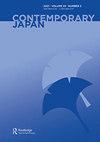War memories and Japanese citizens’ views toward the self-defense forces
引用次数: 1
Abstract
ABSTRACT War memories among the Japanese have played a critical role in shaping their perceptions of peace, providing various opportunities where they can learn about World War II. In spite of their critical importance in Japanese society, very few studies have systematically examined how war memories influence Japanese citizens' views toward defense issues. The present research addresses the gap in the literature. More specifically, this study examines how exposures to war memories shape Japanese citizens' opinions of the Self-Defense Forces (SDF). Building upon the implications from studies on peace education and international relations, I hypothesize that exposures to war memories enhance Japanese citizens' support for the SDF's “reassurance” Strategy, which emphasizes a more conciliatory stance in the world. Results of the statistical analysis relying on the survey data in Japan verify the validity of this hypothesis. By dissecting the process through which Japanese citizens develop their opinions about defense policy, this study significantly advances our understanding of the relationship between peace education and international relations, thus providing critical implications that are highly useful in understanding Japan's security culture.战争记忆与日本国民对自卫队的看法
日本人的战争记忆在塑造他们对和平的看法方面发挥了关键作用,为他们提供了了解第二次世界大战的各种机会。尽管战争记忆在日本社会中至关重要,但很少有研究系统地考察了战争记忆如何影响日本公民对国防问题的看法。目前的研究解决了文献中的空白。更具体地说,本研究考察了接触战争记忆如何塑造日本公民对自卫队(SDF)的看法。基于和平教育和国际关系研究的影响,我假设接触战争记忆会增强日本公民对自卫队“安抚”战略的支持,该战略强调在世界上采取更和解的立场。基于日本调查数据的统计分析结果验证了这一假设的有效性。通过剖析日本公民对国防政策看法的形成过程,本研究极大地推进了我们对和平教育与国际关系之间关系的理解,从而为理解日本的安全文化提供了非常有用的关键启示。
本文章由计算机程序翻译,如有差异,请以英文原文为准。
求助全文
约1分钟内获得全文
求助全文

 求助内容:
求助内容: 应助结果提醒方式:
应助结果提醒方式:


